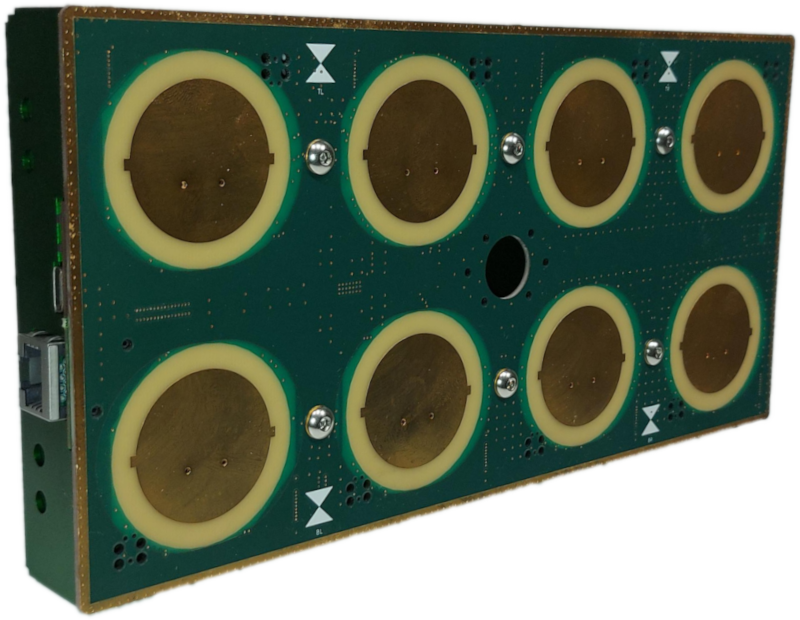
ESPARGOS: ESP32-based WiFi sensing array
Develop and deploy WiFi sensing applications effortlessly: ESPARGOS is a phase-coherent ESP32 antenna array.
Channel State Information
ESPARGOS provides Channel State Information (CSI) estimated from the L-LTF and HT-LTF pilot symbols in real time. Viewed in frequency domain, CSI contains information about the phase shift and attenuation experienced by the OFDM subcarriers. After a fourier transform, CSI can be interpreted as a channel impulse response. ESPARGOS supports channel bonding, achieving a bandwidth of up to 40 MHz.
Power over Ethernet
Avoid the hassle of running separate data, power and signalling cables: ESPARGOS is controlled over Ethernet, provides a simple web interface for configuration and can be powered from a power over ethernet (PoE) switch / injector. This makes ESPARGOS easy to use and deployments are quick to set up.
Python Library
With pyespargos, there is an easy-to-use library to control one or multiple ESPARGOS devices.
Configure ESPARGOS with the built-in web interface, and then easily stream channel state information to your application in real time.
The python library comes with a collection of demo applications to get you started.
Demo Applications
Use the MUSIC algorithm for angle of arrival estimation: Visualize spatial spectrum.
View Demo on GitHubCombine multiple 2 × 4 ESPARGOS antenna arrays into one large phase-synchronous array.
View Demo on GitHubInstantaneous Frequency-Domain CSI
Visualize the frequency-domain channel state information captured by all antennas.
View Demo on GitHubVisualize the time-domain channel state information captured by all antennas.
View Demo on GitHubVisualize the received phase at each of the 2 × 4 antennas of the antenna array.
View Demo on GitHubMonitor the average received phase at all antennas as it changes over time.
View Demo on GitHubMonitor the precise time of arrival of WiFi packets at each antenna array.
View Demo on GitHubShow received WiFi signal power and delay as an overlay on top of a camera image.
View Demo on GitHubReal-Time Indoor Localization Demo
With ESPARGOS, existing WiFi devices like smartphones, robots and other machines can be localized in indoor environments without requiring any changes to those devices. In line-of-sight environments, ESPARGOS can simply locate devices by triangulation. Channel Charting allows the system to locate devices even if there is no line-of-sight path between ESPARGOS and the end device. This application was publicly demonstrated at the Berlin 6G Conference 2024.
How to obtain ESPARGOS?
We have started to provide ESPARGOS devices to research groups and industry partners within the EU, but availability ist still extremely limited. We are currently working on scaling up production in spring / summer 2026, but many legal and some technical challenges are still being sorted out. If you would like to be notified when ESPARGOS becomes more widely available, please sign up for updates below. In the meantime, check out our public datasets!
Sign up for Updates

